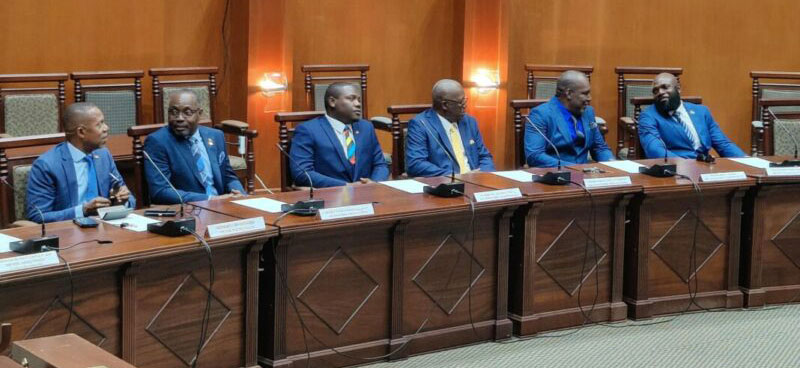ANTIGUA & BARBUDA | Opposition Refuse to Accept Salary Increase Unless Pensioners Are “Satisfied”

ST JOHNS, Antigua, April 8, 2024 - In a remarkable display of solidarity with the nation's pensioners, the United Progressive Party (UPP) of Antigua and Barbuda has taken a firm stand, refusing any salary increases for its parliamentarians until the longstanding issues surrounding pensioners' payments are fully resolved.
This bold decision highlights the party's commitment to prioritizing the welfare of the nation's elders over their own financial benefits, challenging the government's handling of fiscal policy.
The crux of the dispute centers around Prime Minister Gaston Browne's explanation for the delay in implementing a 14% salary increment that was supposed to benefit opposition parliamentarians, along with pensioners and ambassadors.
Browne attributed the postponement to a parliamentary glitch, a reasoning the UPP has outright rejected. In a pointed press statement, the UPP criticized the Prime Minister's justification as baseless, emphasizing the lack of formal notification to its parliamentarians about the proposed increase.
This rebuttal sheds light on the transparency and procedural concerns within the country's legislative processes.
Further deepening the controversy, the UPP called attention to discrepancies in Browne's statements regarding the pensioners' increase.
They pointed out the established tenure of their members, dating back to before the contentious General Election of January 18, 2023, contradicting the Prime Minister's implications about their eligibility for the increase.
 The party also referred to Cabinet Notes from November 2023, which vaguely promised an adjustment in pension payments to reflect inflation and the decreasing value of money, yet lacked clarity on the exact figures and feasibility.
The party also referred to Cabinet Notes from November 2023, which vaguely promised an adjustment in pension payments to reflect inflation and the decreasing value of money, yet lacked clarity on the exact figures and feasibility.
In a decisive move, Opposition Leader Jamale Pringle and his UPP colleagues have vowed not to accept any personal financial enhancements until the pensioners' grievances are adequately addressed.
This stance is not only a critique of the current administration's fiscal management but also a pledge to safeguard the interests of the most vulnerable segments of society.
The UPP's position resonates as a principled stand against perceived governmental inefficiency and obfuscation, underscoring their commitment to accountability and social justice.
This unfolding situation in Antigua and Barbuda serves as a significant moment in the nation's political discourse, highlighting the urgent need for a resolution that honors the commitments made to its senior citizens.
The UPP's refusal to accept salary increases until pensioners' payments are satisfied is a powerful statement on prioritizing community welfare over personal gain, setting a precedent for political accountability and integrity.
As this saga unfolds, the UPP's decision underscores a deep-seated frustration with the current administration's fiscal policies and communication practices.
By publicly refusing salary increases, the opposition not only challenges the government's priorities but also brings to the forefront the broader issue of financial transparency and responsibility in Antigua and Barbuda.
This act of defiance is a call to action, urging the government to fulfill its obligations to the pensioners, whose contributions to the nation over the years cannot be overlooked.
The debate over the delayed salary and pension increments reveals a complex web of political and financial accountability issues. The opposition's critique of Prime Minister Browne's explanations as "nonsense" speaks volumes about the current state of political discourse in the country.
The UPP's insistence on clarity and fairness in the handling of public funds reflects a growing demand for governance that is both transparent and equitable.
In highlighting the plight of pensioners amidst this financial controversy, the UPP brings attention to the often-overlooked impact of political decisions on everyday lives.
Moreover, the historical context provided by the UPP, citing their parliamentarians' tenure and previous commitments to pension increases, lays bare the need for a consistent and fair approach to financial management within the government.
This situation also raises questions about the procedural mechanisms in place for implementing such financial changes and the need for a more inclusive and informed debate on fiscal policies that affect the nation's citizens directly.
In conclusion, the stance taken by the United Progressive Party is a poignant reminder of the enduring power of principled politics. By placing the welfare of Antigua and Barbuda's pensioners above their own, the UPP parliamentarians have not only highlighted a critical social issue but have also set a standard for accountability and selflessness in public service.
As the nation watches this situation unfold, it is a stark reminder of the importance of governance that genuinely serves the public interest.
The resolution of this dispute will undoubtedly have lasting implications for the political landscape of Antigua and Barbuda, emphasizing the need for a government that listens to and acts in the best interests of all its citizens.
-30-
